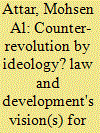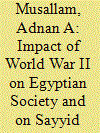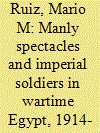| Srl | Item |
| 1 |
ID:
116845


|
|
|
|
|
| Publication |
2012.
|
| Summary/Abstract |
Law and development, as both movement and practice, has led a tumultuous life: a hurried zenith cut short by a fatal critique followed by an opportunistic resurrection. The name alone is sufficient to trigger a range of reactions, extending from the complimentary to the condemnatory. In this article I track law and development's evolution via an examination of its role in the remodelling of Egyptian society in the post-Nasser era. While the 2011 revolution has encouraged institutions such as usaid to hasten their legal reform efforts, I argue that these are more akin to counter-revolution by ideology than genuine revolution by law. Nevertheless, rather than relegate the movement to the annals of imperial intrigue, I conclude by proposing the use of legal pluralism to revive, and possibly ignite, law and development's emancipatory potential.
|
|
|
|
|
|
|
|
|
|
|
|
|
|
|
|
| 2 |
ID:
174244


|
|
|
| 3 |
ID:
089115


|
|
|
|
|
| Publication |
2009.
|
| Summary/Abstract |
This essay examines the relationship between Indian and Australasian soldiers and colonial Egyptians from 1914-19. Drawing upon memoirs, letters, and the work of Nagib Mahfuz, I argue that the First World War reaffirmed British military rule in Egypt and also posed a danger to it in the form of disorderly soldiers. Because British officials feared the unruly conduct of their troops they promoted manly ideals of self-control to facilitate their control over Egyptian society. Uncontrolled spectacles of wartime violence were therefore critical to the ways in which the British Army deployed masculine behaviour in the service of the colonial state.
|
|
|
|
|
|
|
|
|
|
|
|
|
|
|
|